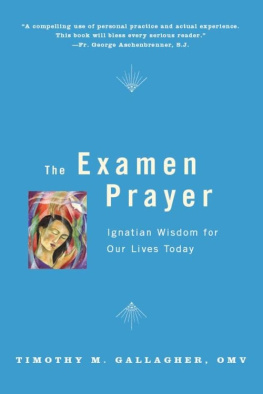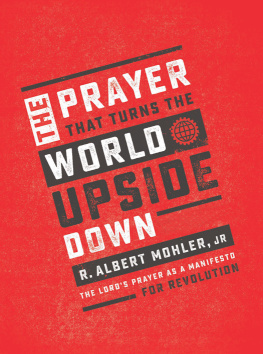A VIEW OF GOD
IN THE LORDS PRAYER
The Power, Place, and Manner of Prayer
Douglas D. Simpson
Copyright January 2015
Douglas D. Simpson
Smashwords Edition License Notes
This ebook is licensed for your personalenjoyment only. This ebook may not be re-sold or given away toother people. If you would like to share this book with anotherperson, please purchase an additional copy for each recipient. Ifyoure reading this book and did not purchase it, or it was notpurchased for your enjoyment only, then please return toSmashwords.com or your favorite retailer and purchase your owncopy. Thank you for respecting the hard work of this author.
All rights reserved. Inaccordance with the U.S. Copyright Act of 1976, the scanning,uploading, or sharing any part of this book without the expresswritten consent of the publisher and/or author constitute unlawfulpiracy and theft of the authors intellectual property. If youwould like to use material in this book (other than for reviewpurposes) prior written permission must be obtained by contactingthe author at
Douglas D Simpson Books
www.DouglasDSimpsonBooks.com
www.DouglasDSimpson.com
Chapter 1 - The LordsPrayer
After this manner therefore pray ye:
Our Father which art in heaven, Hallowed be thyname.
Thy kingdom come. Thy will be done in earth, asit is in heaven.
Give us this day our daily bread.
And forgive us our debts, as we forgive ourdebtors.
And lead us not into temptation, but deliver usfrom evil: For thine is the kingdom, and the power, and the glory,forever.
Amen. Mt. 6:5-13
We are very familiar with the above words ofJesus commonly called the Lords Prayer. Jesus tells us this is themanner in which we should pray.
Do you think Jesus intended for his disciplesand people of today to repeat and recite these lines in public andprivate, as individuals and groups, or in the myriad of times andplaces this is heard? I think not.
Jesus offered this prayer in contrast to what hecalled the hypocrites manner of prayer. The hypocrites stood inpublic places praying aloud so all around could hear their devotionto God. Jesus tells his listeners this is not the way to addressGod. His problem with the hypocrites had to do with the place wherehe prayed and the manner in which he conducted the prayer. But thereal problem which these made obvious was the mind and spirit theman reflected in his prayer.
Most any given group of people in our societycould join in a recital of these lines if led by an individualquoting them. This group can span a wide range of spiritual andreligious convictions or lack thereof yet find this prayer in theirmemory. The process of voicing the prayer may bring emotional andmental reactions, reverence or apathy, joy or sadness, peace ordivision, love or hatred, and probably many other reactions.
As is everything that Jesus said, the importanceof these lines is not in the repeating of memorized Bible versesbut in the manner in which we think. The hypocrites were standingand publicly repeating eloquent prayers to be heard by others todisplay their reverence and worship to God. Although the words oftheir prayers may have had value in the right atmosphere andmindset they tread on the boundaries of arrogance before God asthey were presented.
The following chapters go beyond the words ofthis prayer and delve into the possibilities of what they suggestto us. Jesus did not intend to have his words quoted as poetry. Hewas not a poet but a teacher of spiritual truths that lead tothings far beyond what we can imagine or express in any combinationof words or even in thought.
Chapter 2 - What isprayer?
Definition of Prayer
It is focusing on a strong desire, a longing, agoal or objective.
Prayer may be defined as an aspiration, thesupplication of the lower for spiritual advancement. (Gaskell 1981, 592) An aspiration is an audible breaththat accompanies a speech sound. (Merriam-Webster.com n.d., 1a) Prayer is an address (asa petition) to God or a god in word or thought., an earnestrequest or wish.,the act or practice of praying to God or a god (Merriam-Webster.com n.d., 1a,1b,2)
You might note throughout my books I quote onlya few sources. These are mainly for authenticity in the words. Iwill quote the King James Version of the Bible, dictionaries, andreference materials for the language of the original writings. Inormally do not quote other authors as the content comes from myown inspiration. I believe we are often sidetracked by opinions,perceptions, and misconceptions about who God is and what he says.My writing comes from a lifetime of study and experience in thepursuit of truth. I am not, nor do I claim to be, an authority inthe field.
I am not capable of knowing how God thinks, whathe wishes, or even who he is, nor do I believe anyone else has suchcapability. I do think we can learn a minute amount of knowledgethrough the spiritual person that we are. The physical mind islogical and I am sure most would agree the degree and accuracy ofmans logic covers a wide span of differences in wisdom, accuracy,and common sense. Jesus tells us the best teacher we can have isthe Holy Spirit of God.
If we are to use the Bible as a source, let usunderstand that it is a collection of documents written by manrecording both personal experiences and oral history passed downfrom one person to another. This information is recorded by a groupof Jewish and Christian writers in a time now two thousand years inthe past. We as man today must somehow interpret the meaning of apeople of twenty centuries ago who spoke a different language andlived in an entirely different society than most of us in theUnited States know today.
I have attempted to show accepted Englishtranslations of the language in which the Bible was written and ourcurrent referenced definitions for those translations. Throw intothis mix the differences between the physical mind and thespiritual mind, our physical world and the world of a spiritual Godand we hope to arrive at an idea of what Jesus tried to teach thepeople he spoke with. We then must bring those teachings into thepresent.
So drawing from the noted definitions prayermight be thought of as focusing on and expressing the desires,longings, goals, thoughts, and objectives from the depths of ourbeing to God.
Prayer as I have learned to view it in my ownlife is whatever I focus my mind on and how my desire drives thatfocus. I believe we are continually communicating with God whetherintentionally or not. It is generally accepted that we cannotefficiently focus on two things at the same time. It has beenproven that in most cases if we do multi-task we diminish theeffectiveness of each of the tasks involved.
We also have more power to do the one thing thatwe are focused on if it is a concentrated focus. For example I findit is hard to drive a nail straight if I am focused on how farbehind I am finishing the job I am working on. But when I focus thehammer on the nail I can drive the nail in straight and with muchfewer swings of the hammer than if my mind is elsewhere. Trylifting a heavy weight while thinking about flying paper airplanes.Then try again totally focused on lifting the weight. You willdiscover that your level of power is different depending on yourfocus.
Prayer is this same way. When our focus is onGod and his desires for us we will discover the results of ourprayer to be far more effective than reciting a list of things wewould like to see changed in our physical reality while we arethinking of getting to the restaurant or ball game. Focusing onmiserable we are, how little we have, and how much stuff we want isa real prayer killer. When our focus is driven by the desire to befully in agreement with God and making every moment of life countto his good becomes our prayer is empowered.
Next page
















